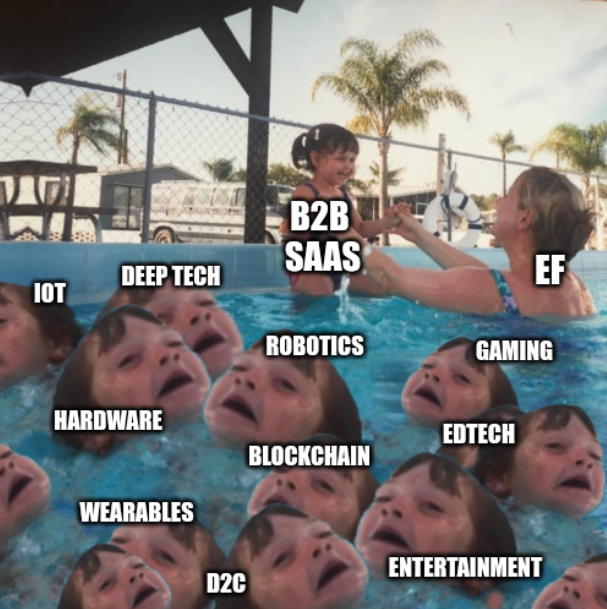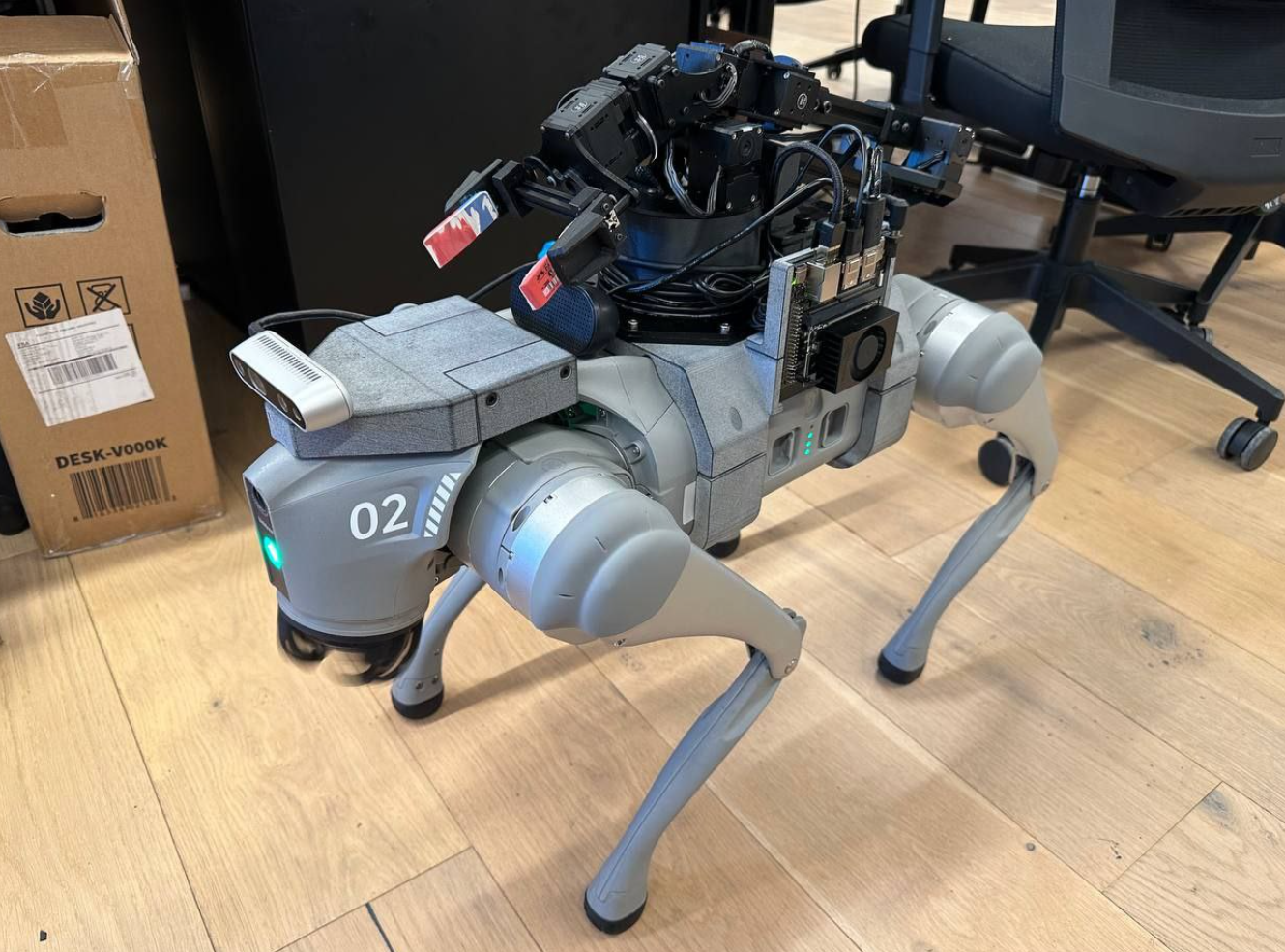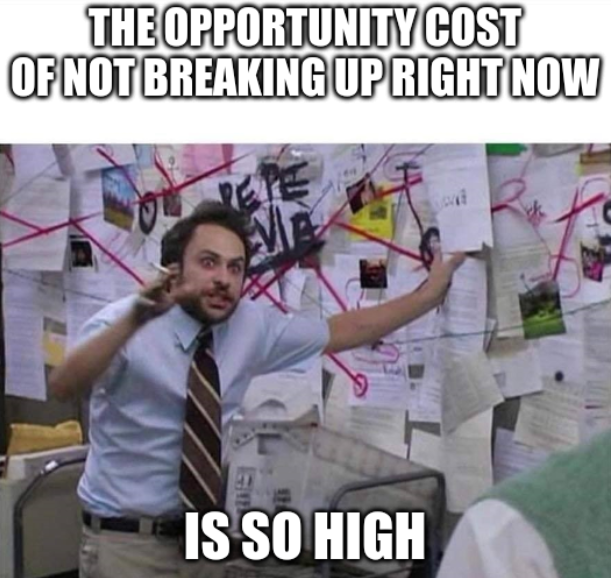
As my journey with Entrepreneur First (EF) comes to an end, I want to document the process along with my opinions and impressions on the program. I am doing it for several reasons:
This write-up contains additional context, so feel free to skip to the Reflections part to get straight to the point.

Entrepreneur First is a pre-team pre-idea acceleration program that aims to bring together ~60 young specialists who are willing to build a company but don’t have a co-founder and an idea to work on. They give you some money and put you in the following process:
I will be covering the first 8 weeks of the team-building phase.
In November 2023 I moved on from developing AskGuru and started looking for what to do next. I played with finetuning LLM on my Telegram messages and estimating the amount of VRAM required for training jobs, but then my wife Taya got me interested in robotics: she is working on the perception of autonomous food delivery robot. We bought a small RC car with LiDAR, a camera, and a computing board and started trying ROS, SLAM, navigation algorithms, and other robot stuff. We had a lot of fun with it, and later I began to play with a robotic arm at Yandex’s office. I made a pipeline for grasping arbitrary objects and having a lot of fun with it again, I thought that I wanted to give robotics a try at EF.
Here is the rough timeline of the main events:
In November 2023 I applied to the S24 Core cohort in London.
I had 4 meetings in total with different members of the London EF team, where each discussion boiled down to them trying to identify my “Edge”, e.g. what am I good at and what I can bring to other cohort members. If you want to start speaking their language before the program you can check out How to be a Founder book by EF’s founders, although I wouldn’t recommend reading it apart from the reason of understanding EF’s way of thinking (more on it in the Ideation framework is questionable section).
After being accepted to the program in January there were legal issues with my participation because of the color of my passport. Gladly, the EF team did their best (kudos to James) and I was finally able to join.
There were ~60 people in the cohort. Before the beginning of the program, I started to have first calls with people to get to know each other. I wouldn’t say it was beneficial, because you barely memorize the person and offline experience completely overrides online impression.
The first offline event was the kick-off weekend at the end of March, 2 weeks before the beginning of the program. Stupidly enough, I forgot to check the visa beginning date so I spent this weekend in a hotel near the Istanbul airport, missing kickoff weekend and arriving right after it.
There weren’t many people in the office in these 2 weeks before the official start, so this time was primarily spent on getting to know people who were in the office and wrapping up some contract work.
During this phase, every week you have two check-ins:
So the main focus for the following 2 months became finding a cofounder.
I had a pretty fixed vision of building a robot housekeeper at this moment so it was challenging to find a cofounder for the idea because the majority of people came to be the founders and didn’t want to be hired for the idea they weren’t involved in shaping in. As I didn’t have most parts of the robot and TI’s kept putting pressure to partner up, I’ve started working with Szymon on his idea around consumer goods discovery. We were getting along very well and I decided to give it a shot.
We made good progress on the idea, figuring out the recurring problems people face and making an MVP. But as robot dog parts arrived and it was great working together, Szymon decided to give the robot dog idea a try.
We assembled the dog and made the demos of loading/unloading the dishwasher, wiping the table and the autonomous leaf collection pipeline. When I realized that I wanted to grow as a CEO, we brought Taya as a CTO, because there is no better technical co-founder for a robotics company. Later on, Szymon left and we decided to bring Taya to the cohort to pitch to IC together.

Ultimately, they’ve chosen not to proceed with me or bring Taya to the cohort, outlined by the reasons in EF team is not good at communicating openly chapter.
These are things that I feel after going through the teambuilding phase. Other people might have different experiences. The goal is not to praise or judge but to express what happens inside and how it feels for me.
Being surrounded by people of your age doing the same thing always works. It helps to see what other people are working on, how they are doing it, and what results they have. The ability to bump thoughts and ideas around also helps.
This is probably 90% of all the value that the program brings.
Find co-founder (2 months) ➜ get some traction (1 month) ➜ raise pre-seed ➜ get some more traction (2 months) ➜ raise seed — pretty good momentum for those who were able to stay in a stream, given the fact that they didn’t have co-founder and idea at the beginning.
Pre-seed deal got better 2 times while I was in the cohort and now it is $125k for 8% and $125k uncapped, which is decent.
During my 2 months in the program and across all conversations and pitch feedback I had 1 talk with an entrepreneur and 1 feedback on a pitch from an entrepreneur. The rest of the input comes from people who don’t have their story of founding and growing a successful company.
This results in a few things:
I understand that my job as a founder is so to take whatever advice I get and decide what to do on my own. The problem is that you can’t just ignore bad advice and do your thing because you want them to invest so you should somehow take it into account and balance between doing the right thing and pleasing them.
In general, the best advice is on “how to do” something instead of “what to do”, but if you as an advisor don’t have any relevant experience you can’t tell “how” and keep repeating generic “what”.

The whole idea of the EF framework is that you should start a company that is at the intersection of your and your cofounder’s edges (skills and knowledge), making you the best team suited for the problem (having “unfair advantage” and a “founder-idea fit”). While this “right to win” is important and is a reasonable team evaluation technique, in reality, I saw other things being prioritized over having an “unfair edge intersection” within the co-founder search process:
So the amount of talk about the ideation framework is disproportional to the actual impact it has on forming a great team. If you would just have 60 qualified people in the same room without a job and willing to start a company, the number of success stories will be roughly the same with or without the ideation framework, and there are probably better ways of speeding up the process of forming the right team.

It is incorrect to compare EF to YC or similar programs that give you money upfront. At EF, you feel like you are constantly being evaluated on how suitable you are for them to invest in. For example, in the second month, they started to give scores to the teams from 1 to 4 representing how likely you as a team get through IC. You don’t have this pressure at programs where you have money in your pocket from day 1.
The team building stage is a love island, where rumors spread like wildfire, members discuss each other behind the back and the EF team is putting a lot of pressure on team members. If you ideated with somebody apart from your cofounder, the next day everybody will think that you are up to breaking up.
They ask you to write a reason for a breakup but almost always it is BS because nobody wants to make other people look bad publicly. So the real reason is different most of the time and can be understood in 1-1s. Examples of made-up breakup reasons:
Real reasons are much more down to Earth, and mostly touch things I’ve outlined in the Ideation framework is questionable section.
EF team will often say that you should break up with your cofounder because the opportunity cost of being in the wrong team is very high. I think that saying this often is unhealthy because it entices cohort members to drop their cofounders even before getting to know them and before properly invalidating common hunches. Though, unintentionally this might be a good thing because a strong team will stay together no matter what, and a team where people are having doubts will probably break up anyway.
While giving scores of how likely each team is to get through IC, doing it publicly is controversial. It is easy to start feeling insecure after publicly getting a bad score which may result in a drop in motivation.

If you are not able to find a cofounder within your cohort, it is possible to bring the co-founder from the outside. They should go through the same interviews and evaluation processes as the other cohort members. As I was convinced that I wanted to work on robots and be the CEO, Taya was the ultimate choice because of her unique robotics expertise and the fact that we are getting along very well.
After her first introductory call with the EF team, interaction with them became slow. We were asking for the decision and the next steps and were given generic replies. In a week, we have scheduled the advisory meeting with the senior EF team member to evaluate if the thing we are working on makes sense. The advisor was skeptical about the idea but was convinced that the path we are taking until IC (get ~20 ~$100 preorders on the robodog) is the right path and achieving this milestone would be impressive.
After ghosting and postponing meetings, we finally got short and generic feedback that they wouldn’t continue with us. After trying to schedule another 15-minute meeting with a senior member for 3 days, I got this feedback:
In retrospect, it looks like they made up their mind about my participation in the following stages in mid-May, so the following actions and their response to me bringing a cofounder was more like a theater. Feels like their idea was to postpone the decision of bringing the external cofounder to the very end and then say that they couldn’t continue because I don’t have a cofounder, so they could avoid hard conversations.
Here are the questions for which I either received no answers or only generic BS responses:
As a remark, it is fine for me not to get support from EF, because I realize that it is their money and they are free to do whatever they want with them. The point is that you can be more clear with your communication to avoid building unnecessary expectations.
Recently I compiled a list of startup accelerator and incubator programs, and EF is unique in the sense that they accept you without the team and idea, providing you with the environment to find both. There are two similar programs:
I am glad that I had this opportunity and I find it very valuable. I believe that in EF you can accomplish more than you could accomplish without it. I made good friends, had interesting conversations, and in general had a great time.
There is for sure a big room for improvement, but just knowing what to expect can make the experience 10 times better.
Answering the title question, I think the program is 100% worth the time, especially if you don’t have friends willing to start a startup and/or have no idea what to work on. It gives you a sense of belonging to something while trying the hard journey of starting a company.